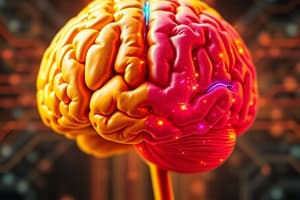Podcast
Questions and Answers
What is the primary goal of cognitive enhancement (Cogn)?
What is the primary goal of cognitive enhancement (Cogn)?
- Enhancing physical strength and endurance
- Optimizing social skills
- Improving mental performance and brain function (correct)
- Maintaining physical health
Which disciplines contribute to the field of cognitive enhancement?
Which disciplines contribute to the field of cognitive enhancement?
- Neuroscience, psychology, and medicine (correct)
- Physics, chemistry, and biology
- Astronomy, geology, and anthropology
- History, literature, and art
When did the modern era of cognitive enhancement (Cogn) start?
When did the modern era of cognitive enhancement (Cogn) start?
- Early 20th century (correct)
- Late 19th century
- Medieval period
- Ancient Greek times
What are nootropics commonly referred to as?
What are nootropics commonly referred to as?
Who coined the term 'nootropics' in 1972?
Who coined the term 'nootropics' in 1972?
In what way does neurofeedback contribute to cognitive enhancement?
In what way does neurofeedback contribute to cognitive enhancement?
Which method of cognitive enhancement involves recording brain activity and providing real-time feedback to the user?
Which method of cognitive enhancement involves recording brain activity and providing real-time feedback to the user?
What is a common component of nootropics that is known to enhance cognitive function?
What is a common component of nootropics that is known to enhance cognitive function?
Which practice has been shown to reduce stress, improve focus, and enhance cognitive function?
Which practice has been shown to reduce stress, improve focus, and enhance cognitive function?
What is a potential risk of sleep deprivation in relation to cognitive function?
What is a potential risk of sleep deprivation in relation to cognitive function?
Which area of research in cognitive enhancement involves developing devices that directly interact with the brain?
Which area of research in cognitive enhancement involves developing devices that directly interact with the brain?
What is a key benefit associated with mental training exercises like brain-training games?
What is a key benefit associated with mental training exercises like brain-training games?
Flashcards are hidden until you start studying
Study Notes
Understanding Cognitive Enhancement (Cogn)
Cognitive enhancement, often shortened as "Cogn" for simplicity, encompasses a range of methods and interventions aimed at optimizing mental performance and brain function. This field of study and practice draws from multiple disciplines, including neuroscience, psychology, and medicine, to explore ways of enhancing cognitive abilities, such as memory, attention, and problem-solving.
The drive for cognitive enhancement is rooted in our desire to improve our personal and professional lives. Beyond the basics of maintaining good mental health and intellectual well-being, Cogn aims to equip us with tools to surpass our cognitive limitations.
The History of Cognitive Enhancement
The concept of cognitive enhancement dates back to the ancient Greeks, who believed in the power of education and philosophy to improve mental capacities. However, the modern era of Cogn began in the early 20th century, with the discovery of nootropics and the advent of neurofeedback training.
Nootropics, also known as "smart drugs," are substances that purportedly enhance cognitive function. The term was first coined by Dr. Corneliu E. Giurgea in 1972 and has since been applied to a wide range of pharmaceuticals and nutraceuticals.
Neurofeedback, on the other hand, is a form of cognitive enhancement where brain activity is recorded and fed back to the user in real-time, allowing the individual to adjust and develop their mental abilities.
Types of Cognitive Enhancement
There are numerous methods and interventions aimed at enhancing cognitive function. Some of the most common include:
-
Nutritional supplements: Certain vitamins, minerals, and nutrients have been linked with improved cognitive function. For example, omega-3 fatty acids, found in fish oil, play a role in brain health and development.
-
Nootropics: As mentioned above, nootropics are substances that purportedly enhance cognitive function. Some popular nootropics include caffeine, L-theanine, and piracetam.
-
Meditation and mindfulness: These practices have been shown to improve cognitive function, reduce stress, and increase attention span and focus.
-
Exercise: Regular physical activity has been linked with improved cognitive function and reduced risk of age-related cognitive decline.
-
Neurofeedback: This form of cognitive enhancement involves recording brain activity and feeding it back to the user in real-time, allowing them to adjust and develop their mental abilities.
-
Sleep: Quality sleep is essential for cognitive function. Lack of sleep can lead to impaired memory, attention, and decision-making. Sleep deprivation is also linked with an increased risk of developing mental health conditions such as depression and anxiety.
-
Mental training: Mental training exercises, such as brain-training games, have been shown to improve cognitive function in specific areas, such as memory and attention.
The Future of Cognitive Enhancement
The field of cognitive enhancement is rapidly evolving, with new methods and technologies being developed to optimize mental performance. Some of the most promising areas of research include:
-
Neurotechnology: Neurotechnology aims to develop devices and algorithms that can directly interact with the brain to enhance cognitive function.
-
Brain-computer interfaces (BCIs): BCIs allow users to control devices and computers using their brain activity, potentially enabling new forms of cognitive enhancement.
-
Genomic medicine: Genomic medicine aims to develop personalized treatments and interventions based on an individual's unique genetic makeup.
-
Artificial intelligence: Artificial intelligence is being used to develop cognitive enhancement tools, such as cognitive assistants that can help improve memory and attention.
-
Hybrid interventions: Combining various cognitive enhancement methods, such as nootropics, meditation, and neurofeedback, may result in synergistic effects.
While these emerging technologies and methods hold great promise for improving cognitive function and mental performance, it is essential to approach cognitive enhancement with caution. It is crucial to consider potential risks, such as side effects, adverse reactions, and unintended consequences, before adopting new methods or interventions.
Studying That Suits You
Use AI to generate personalized quizzes and flashcards to suit your learning preferences.



